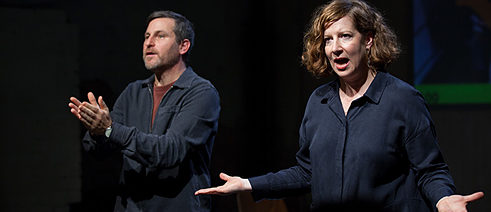Emocracy
No one is immune to populism

How strongly is democracy influenced by emotions? And educated citizens by populism? More than we think, as we learn from the performance Emocracy, a coproduction of Goethe-Institut and Sophiensaele, which celebrated its premiere in Berlin. One of the highlights: the audience essentially decides the course of the two-person play.
So much audience participation is rare: Anyone who gets bored is allowed to just interrupt the alternating two-and-a-half-minute monologues. They stand up, hold their ears shut, and two seconds of speaking time, counted down by a digital clock, are subtracted from the performer.
On the video screen behind the two actors who shape the evening’s entertainment with monologues or arguments in the canteen of Berlin’s Sophiensaele, the plot is broadcast live to the audience. Without even turning around, viewers see at a glance what their seat neighbours decide. Standing up and giving a thumbs up means that the performers are allowed to speak longer or that they like the sound, light and fog effects. And in the second act of the play, the audience vote even determines the progress of the story: whether it should develop more in the direction of a public scolding, say, or whether more or less narcissism or feminism is desired in it.
Seems like political correctness
The pointedly sarcastic anecdotes from the educated milieu, declaimed in a nutshell by the performer duo (Bettina Grahs, Lajos Talamonti), begin with trivial occurrences and gradually reveal the moral pitfalls of a politically correct mainstream. In one case, the performer tells about the night she walked fearfully through a “conduit” of dark-skinned dealers in Gorlitz Park in Berlin, but challenges the usual normalization strategies. “There’s no contact in these conduits, although there’s a lot I’d like to know, like: Why are there only men here? Do you ever eat, or do you just smoke? And what do you actually earn at this job?”In another case, the male performer tells about the son of a friend who lends his toy pistol to another kid on the playground and is not given it back. Then his father addresses the other boy, a Turkish boy, but cannot solve the problem with his tone of voice, which drips with sympathy. Then the boy’s mother appeared on the scene and silenced the father. “Like a queen, she approached him and, full of innate authority, said, ‘How dare you speak to my son that way.’ And he only thought, ‘She’s right!’”
The anecdote that a performer offers up on real estate is more dramatic. First, there’s talk of ever-rising prices on the Berlin housing market, then suddenly the new buyer class of “the Israelis” comes into play. And after the viewers answer “Yes” to the electronically illuminated question “More or less impertinence?” the story escalated so that statements were heard like, “It’s like they are already pushing us out of the neighbourhood – and anyway, I don’t understand their whole religion; it’s downright disgusting. Don’t the men have multiple wives?” The loud laughter in the auditorium responded not only to the absurd conclusion and the sudden flash of racism, but also to how quickly harmless banter turns into nationalistic rhetoric.
“The middle class is just as vulnerable to populist generalizations as other parts of the population,” summed up Till Müller-Klug on the premiere evening. He developed the concept for Emocracy together with Nina Tecklenburg and Lajos Talamonti. The trio make up the Berlin Interrobang Performance group, which drew the attention of the Goethe-Institut in Prague ever since its production Preenacting Europe (2013). Their aim is to develop new participatory stage formats in order to explore socio-political phenomena. With their Reformulation of a Social Contract, the theatre collective produced its latest performance in cooperation with Tekst (Kiev) and Theater.dok (Moscow), each of which contributed their own productions on the topic.
Political force of everyday stories
Their initial question was How have political decision-making processes been changed by growing populism in a society in which those who draw the most attention to themselves are rewarded?Müller-Klug says, “With Emocracy, we wanted to use the micro world of the theatre to test what happens when we appeal to the emotions of the audience and give them a chance to influence what is happening on the stage.”
Strong emotions can suddenly make a liberal-minded person approve of something they would otherwise probably deny as an abstraction – say, the posit of more severity in education, he says. “Even we can only give a nudge to the question of what new kind of contract our society needs,” concedes Müller-Klug. “For us, one important experience was learning that political volatility is hidden even in everyday stories. And that we cannot dismiss populism as something that only the others admire.”